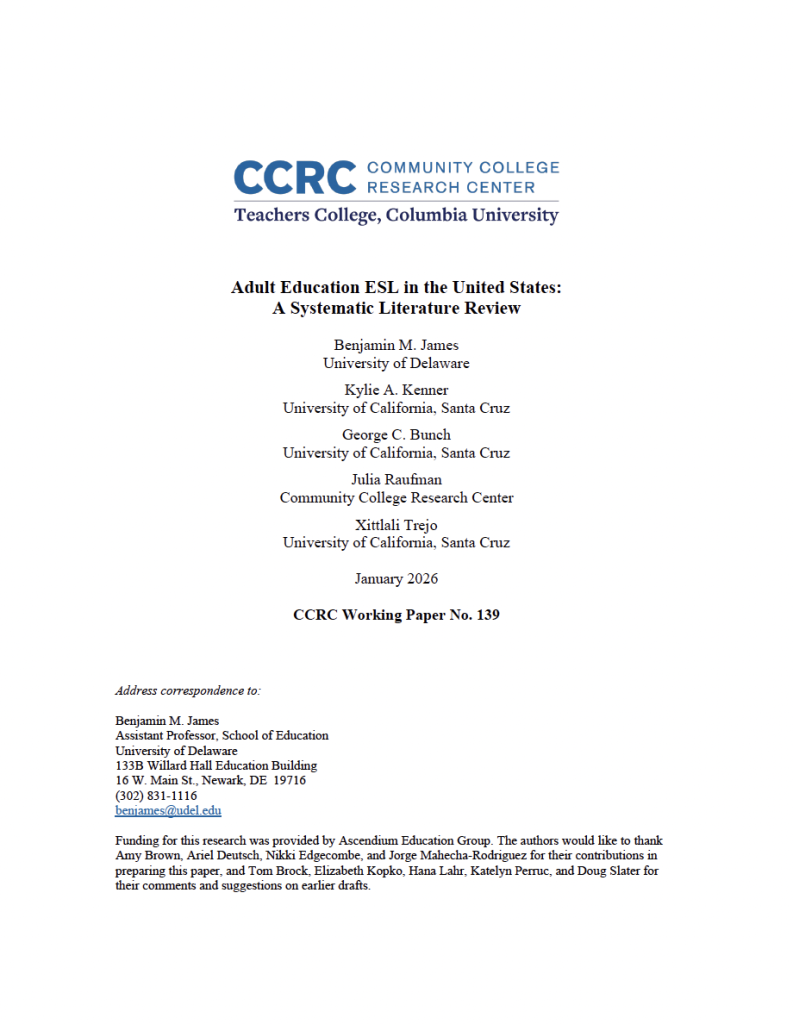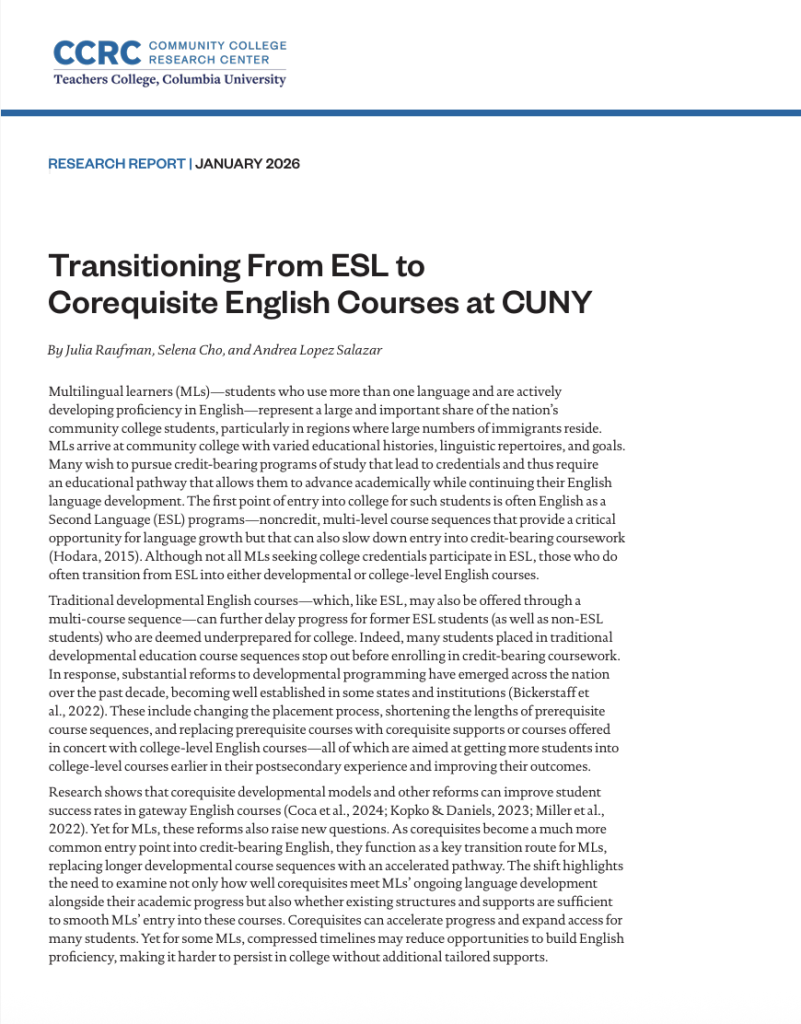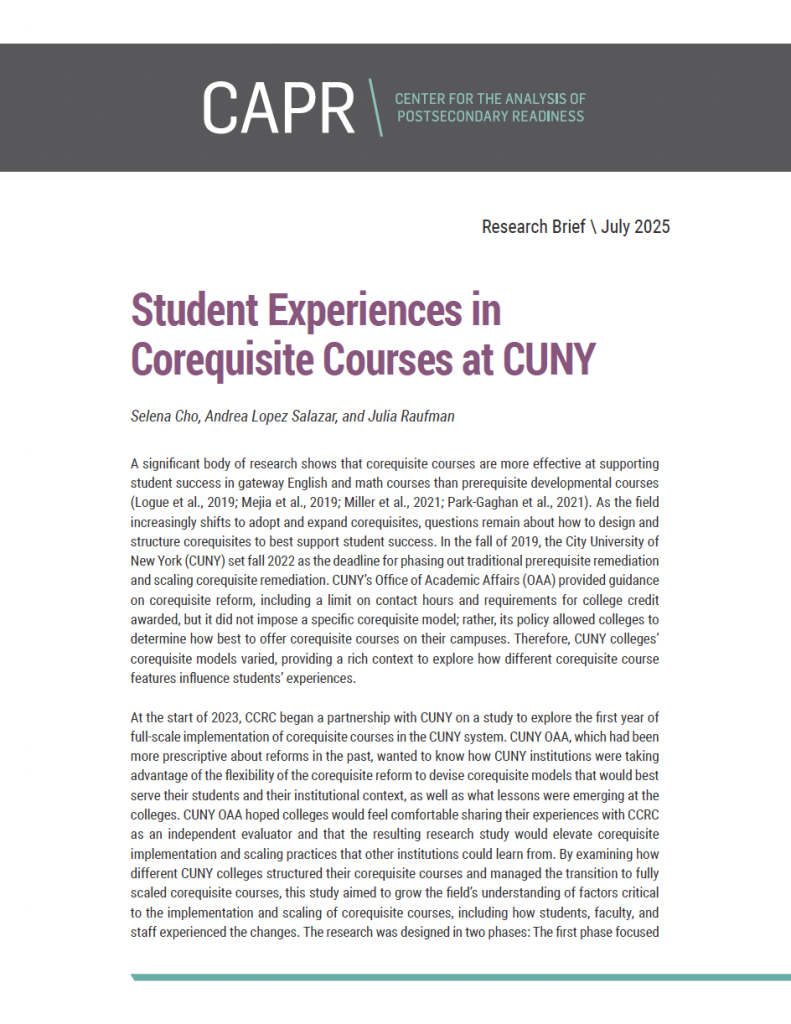Developmental Education
In past years, as many as two thirds of community college students have taken developmental courses—which don’t count toward a college credential—to try to bring their math and English skills up to college level. Colleges are pursuing several reforms to reduce that number and improve outcomes for students.
Fast Facts
Students with low scores on placement tests have traditionally been required or encouraged to take developmental math or English before taking college-level gateway courses. These sequences have been as long as four semesters for some students.
Only a small percentage of students placed at the lowest levels of prerequisite developmental education ever finish their remedial courses.
Reforms that place more students into college-level courses when they start college, including multiple measures assessment and corequisite remediation, help more students pass gateway math and English more quickly.
Black and Hispanic students are more likely to be assigned to developmental courses than White students.
Why We Study Developmental Education
Developmental education is designed to bring underprepared college students up to speed in math or English so they can succeed in college-level courses. But with a large percentage of community college students assigned to developmental courses, it has long been the default introduction to college and a contributor to equity gaps—despite a growing consensus that traditional developmental education is ineffective.
Under traditional multi-semester remediation, students spend time and money completing courses but not accumulating credits toward a credential, and many of them never finish their developmental coursework. Research shows that many students deemed underprepared could succeed in college-level courses without remediation, while others could do so with some additional support. In light of this, colleges across the country are reforming developmental assessment and placement and increasingly instituting accelerated forms of remediation and other reforms. But reforms are not equally benefitting all students, and questions remain about how best to structure and implement reforms and how to ensure that students with the most developmental needs are not left behind. CCRC and the CCRC-led Center for the Analysis of Postsecondary Readiness (CAPR) are continuing to study the evolving developmental education landscape, including how to effectively implement corequisite courses and how to combine corequisite courses with multiple measures assessment.
Featured Publication
This CAPR report synthesizes the evidence from more than 10 years of research on how innovations to developmental education can improve student outcomes.
Major Developmental Education Reforms
Corequisite Remediation
Colleges place students deemed academically underprepared into college-level courses and provide them with additional learning support, most commonly a paired extra-help course in the same subject area.

What We Know So Far
Corequisite remediation helps students pass college-level math and English at higher rates. One recent CCRC study looked at students on the margin of the college-readiness threshold. Students placed into corequisite remediation were 15 percentage points more likely to pass gateway math and 13 percentage points more likely to pass gateway English within one year of enrollment than similar students placed into prerequisite remediation. Other research has found corequisite remediation helps students at all levels of preparation complete gateway courses.

Math Pathways
Instead of requiring most students to take algebra, some colleges are offering sequences of developmental and college-level math courses that align with students’ academic and career goals—such as statistics for social science majors and algebra for STEM majors—and aiming to accelerate students’ completion of math gateway courses.

What We Know So Far
A CAPR study looking at the Dana Center Mathematics Pathways (DCMP) model found that math pathways students were 11 percentage points more likely to pass a college-level math course during their second semester and nearly 7 percentage points more likely to pass a college-level math class by the end of their third semester than students in traditional developmental math. Five years after the start of the study, students were still 5.6 percentage points more likely to have completed their first college-level math course.
Multiple Measures Placement
While colleges formerly often used a single test to place students into developmental or college-level courses, many are now using additional measures, such as high school GPA, to improve placement accuracy. Some systems allow students to consult with an advisor or faculty member to determine the most appropriate course given their goals and academic background through a process called directed self-placement.

What We Know So Far
Results from two experimental studies from CAPR indicate that student outcomes improve under MMA as compared to status quo placement based on test scores alone. In both math and English, at least 15% of students were bumped up into college-level courses, and those students were more likely to complete college-level courses. Students who were bumped up into college-level courses because of MMA continued to have better outcomes after nine terms. A CAPR toolkit pulls together resources for planning and implementing an MMA system.
MMA at NorthWest Arkansas Community College
Ricky Tompkins, the director of the Center for Student Success at Arkansas Community Colleges, talks about how NorthWest Arkansas Community College (NWACC) adopted multiple measures assessment. Find more on the CAPR blog.
Scaling Developmental Education Reforms
Two recent publications offer lessons for scaling multiple measures assessment and corequisite courses.

Podcast
On the Evidence First podcast from MDRC—CCRC’s partner in CAPR—CCRC’s Nikki Edgecombe and MDRC’s Michael Weiss discuss their latest thinking on how developmental education reform can lead to greater equity for students.
Unanswered Questions About Effective Developmental Programs
Based on rigorous studies conducted over several years, this CAPR toolkit is designed to guide college leaders implementing multiple measures assessment and placement through the knowledge-building, communication, and planning steps needed to put the reform in place. The tools include a customizable slidedeck that explains the research behind multiple measures assessment, a guide to pulling out your college’s data, a planning template, a design guide, and videos from college leaders who have implemented multiple measures.








